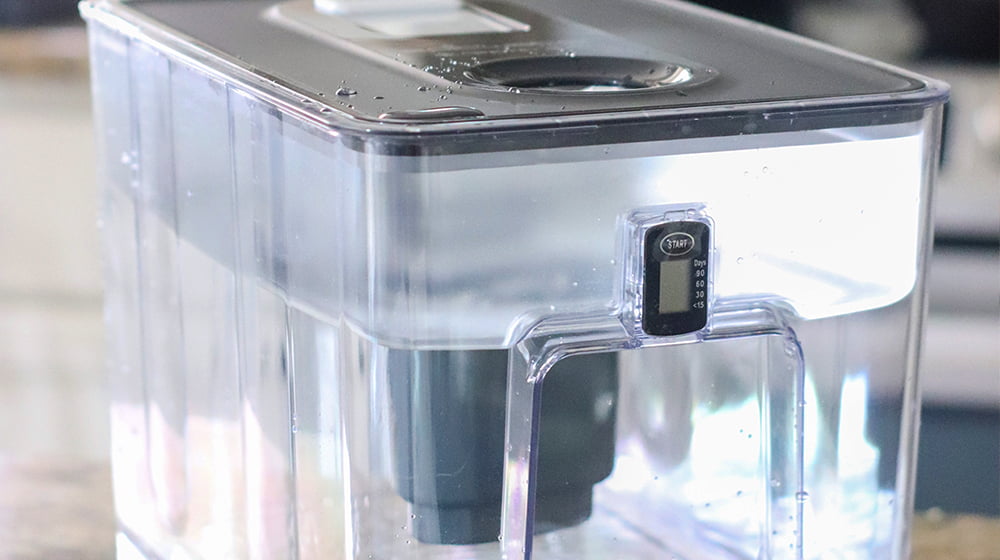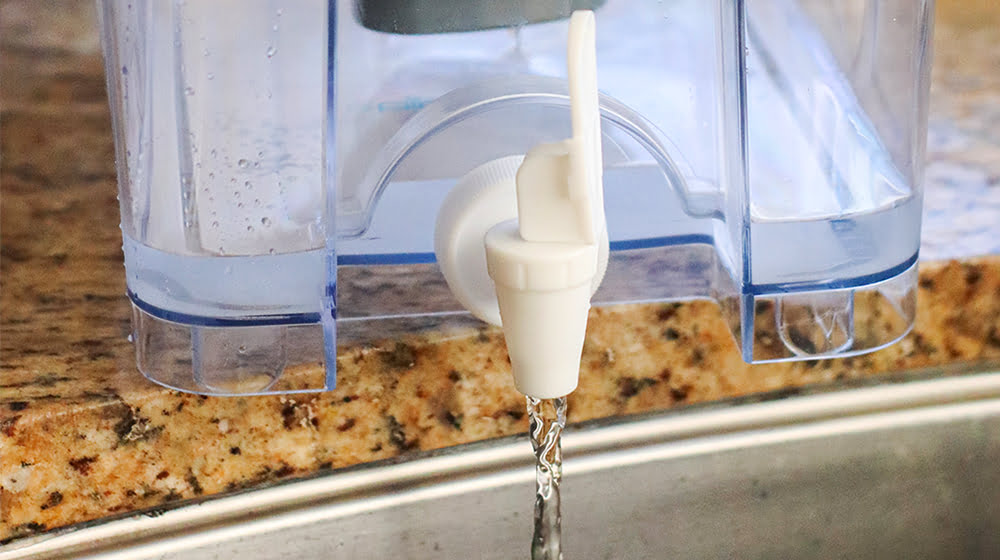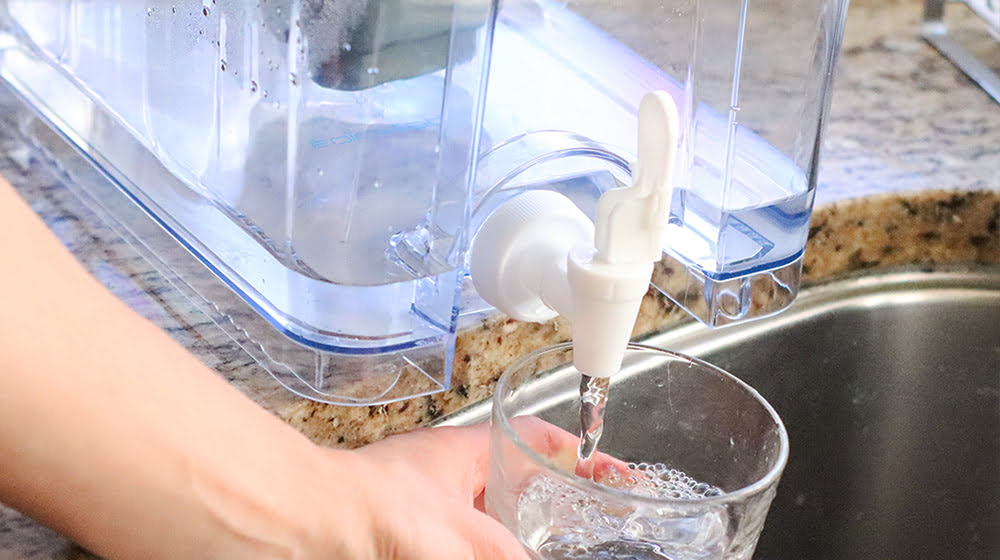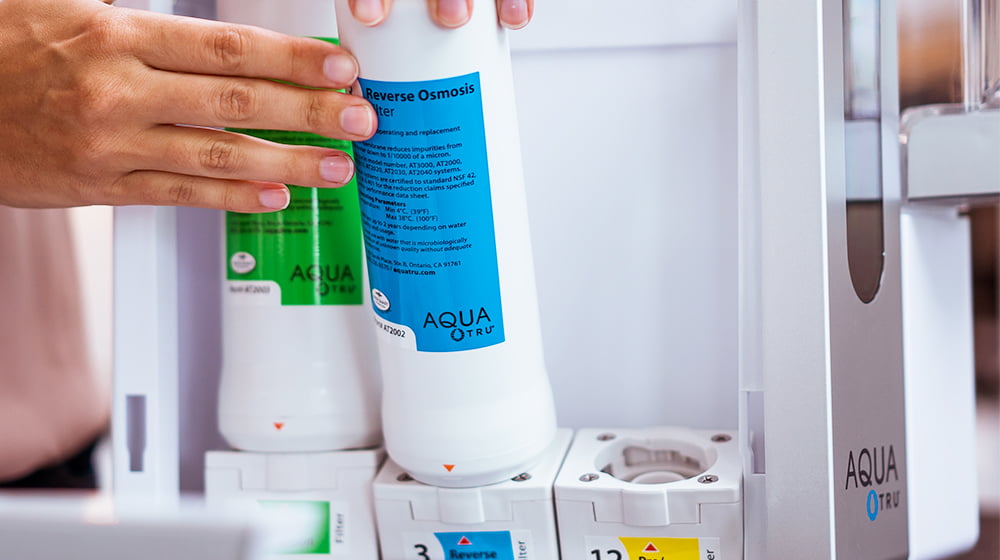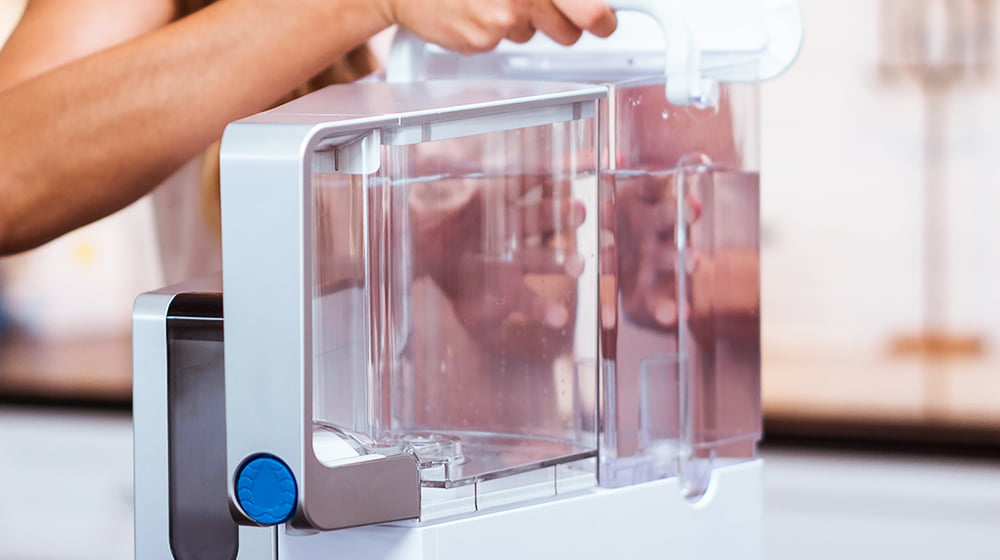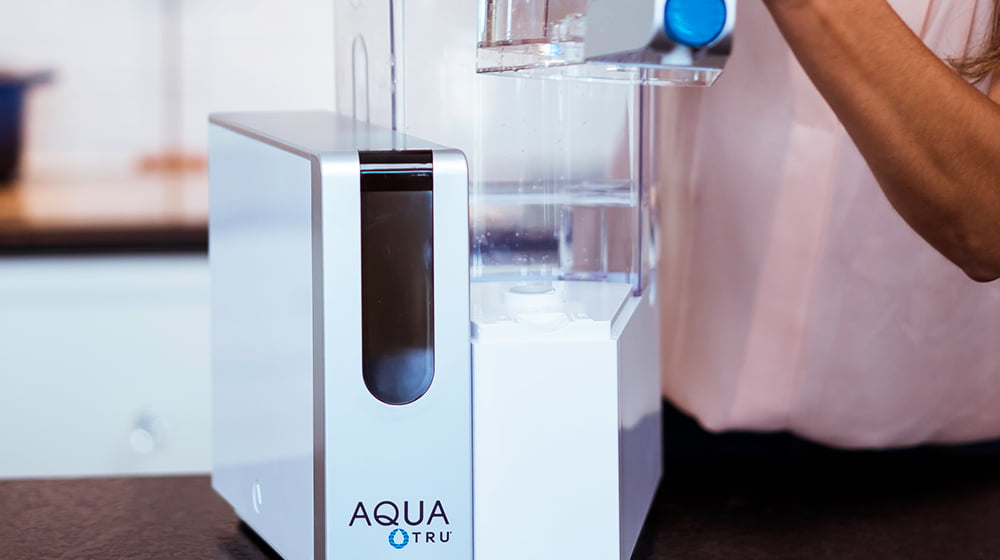8 Best Water Filter Dispensers (*Update 2024)
Written by: Gene Fitzgerald // Expert Fact-Checking: Buddhini Dolapihilla, MBSS // Last Updated: Jan 31, 2024
This page may contain affiliate links. If you buy a product or service through such a link we earn a commission at no extra cost to you. Learn more.
Finding the best water filter dispenser for your family’s needs is about striking a good balance between filtration strength, capacity, and long-term cost.
Most water filter dispensers are relatively inexpensive compared to more advanced water purification systems, but they require regular filter replacements. This cost can add up over time, making it important to pay attention to how long the filter cartridges last and their pricing.
And there are more factors to consider such as filtering speed and ease of use.
So, how do you find the best water filter dispenser? You came to the right place. This guide will help you find your ideal system and not waste your money.
No Time to Read? Check Our List of the Best Water Filter Dispensers!
| Dispensers | Details | |
|---|---|---|
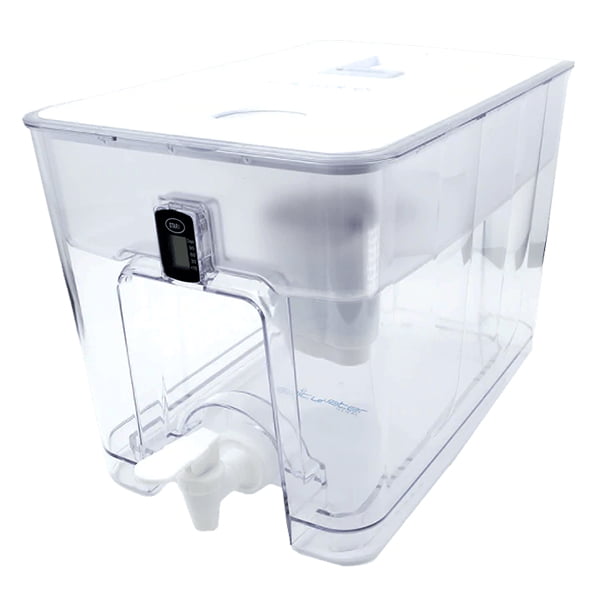 Best Water Filter Dispenser: Epic Pure |
Get 20% Off! Use Code: |
Price: $ Type: Standard Size: 2.2 Gallons NFS/ANSI: 42, 53, 401, P473 Filter Capacity: 150 Gallons Read Review: Click Alexa’s Video Review: Click |
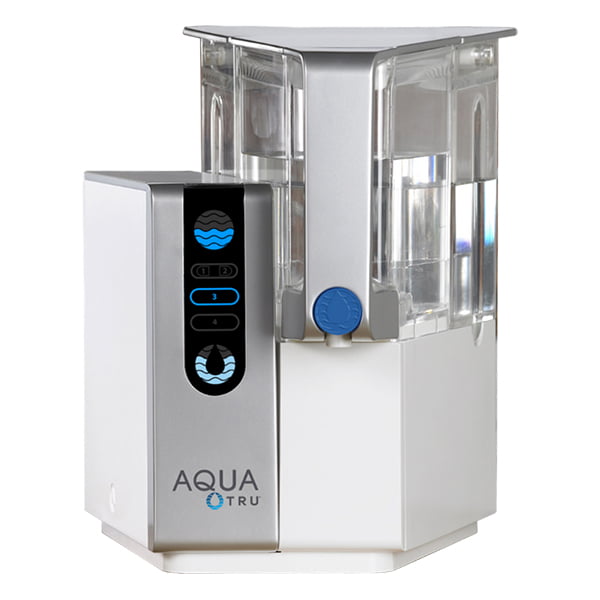 Best Dispenser Using Reverse Osmosis: AquaTru |
Deal Includes Free Replacement Filter Set + 15% Discount Code |
Price: $$$ Type: Countertop RO Size: – NFS/ANSI: 42, 53, 58, 401, P473 Filter Capacity: 600-1,200 Gallons Read Review: Click Alexa’s Video Review: Click Sara’s Video Review: Click |
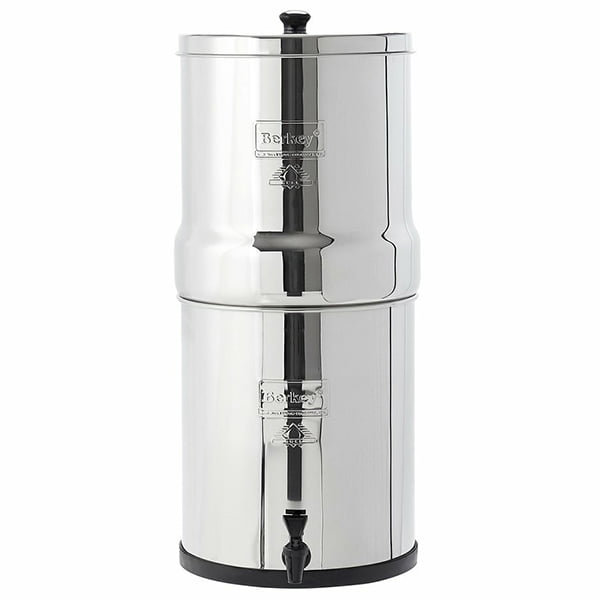 Largest Capacity: Big Berkey |
|
Price: $$$ Type: Gravity Size: 2.25 Gallons NFS/ANSI: 42, 53 Filter Capacity: 3,000 Gallons Read Review: Click |
Best Water Filter Dispenser Reviews
Our Top Picks
- Epic Pure & Epic Nano – Best Overall
- AquaTru – Best for RO Water Purification
- Invigorated Water pH Recharge – Best for Alkaline Water
- Big Berkey – Largest Capacity
- Waterdrop
- ZeroWater 20 Cup – Best for 0 TDS
- PUR PLUS
- Brita UltraMax – Best Budget Option
1. Best Overall: Epic Pure & Epic Nano Water Filter Dispensers
In our opinion, the best water filter dispenser in 2024 is the Epic Pure/Nano.
Which one you want to choose depends on your water supply:
- For (fluoridated) tap water, the Epic Pure is the right choice. It’ll help you get rid of the additive.
- For water that might contain bacteria, viruses, and cysts, go with the Epic Nano. It removes up to 99.999% of these microorganisms.
That said, the filter cartridges are interchangeable, meaning you can use both versions in the Epic Pure/Nano. Thus, you can always switch later on if need be.
Aside from fluoride and pathogens, Epic water filter dispensers are NSF-tested to remove more than 200 different contaminants, including lead, chlorine, chloramine, arsenic, chromium 6, pesticides & herbicides, and microplastics. 5 stars!

Epic Pure |
|
| Price: | $ |
| Type: | Regular |
| Size: | 2.2 Gallons |
| NSF: | 42, 53, 401, P473 |
| Filter Life: | 150 Gallons |
|
Our Rating
Get 20% Off! Use Code: |
|
Alexa’s Video Review
Being part of our team, Alexa has ordered and tested the Epic Pure/Nano Water Filter Dispenser. This means she has ordered, assembled, primed, and used the dispenser in her day-to-day life for several weeks. Alexa shares her hands-on experience and personal verdict in the video below:
Pros
- Users love their filtered water taste.
- Activated carbon block filtration was tested in multiple labs against NSF/ANSI standards 42, 53, 401 and protocol P473 for guaranteed performance.
- Targets chemical additives, heavy metals, VOCs, semi-volatiles, pesticides, trace pharmaceuticals, perfluorinated compounds, and radiological elements.
- The Epic Pure is even more effective at removing certain heavy metals, chemicals, and fluoride.
- Thanks to submicron filtration, the Epic Nano can trap bacteria like E coli, viruses, and cysts such as giardia and cryptosporidium.
- According to NSF protocol P231.
- Nano filter is more resistant to hard water clogging.
- Healthy minerals are left in the water.
- Bottom reservoir can store up to 1.7 gallons of filtered water. Raw water storage is another half gallon roughly. Plenty of water even for family use.
- Fits on most refrigerator shelves.
- Tritan plastic is free from BPA and BPS.
- 150-gallon filter cartridges are long-lasting (2-6 months depending on your water conditions and usage) – effortless!
- Made in USA.
- 100% recyclable.
- As part of Epic’s recycling program, you can collect and send in four used filter cartridges in order to receive one new replacement filter for free.
- Filter life indicator tells you when to change filters (counts down from 90 days).
- Get 20% off by subscribing to replacement filters. You can cancel anytime.
- Epic Water Filters offers additional discounts on their products for military personnel, first responders, medical staff, teachers, students, seniors, and owners and employees of non-profit organizations.
- Lifetime warranty and satisfaction guarantee provide peace of mind.
Cons
- Some people had issues with leaking spouts.
- Others complained about slow filtration and clogged filters. The price for replacement filters is quite hefty so costs can add up in the long run.
Best for
These two dispensers by Epic Water Filters are best for people who seek affordable and yet highly effective tap and well water filtration.
2. Best for Reverse Osmosis Purification: AquaTru Countertop Water Filter Dispenser
The AquaTru is a little different. It’s a water filter dispenser in form of a countertop reverse osmosis system.
The reason why we like it is purely based on filtration performance which is downright excellent (5 different NSF certifications and more than 80 contaminants removed). In other words, it gives you access to great-tasting and safe drinking water.

AquaTru |
|
| Price: | $$$ |
| Type: | Countertop RO |
| Size: | – |
| NSF: | 42, 53, 58, 401, P473 |
| Filter Life: | 600-1,200 Gallons |
|
Our Rating
Deal Includes Free Replacement Filter Set + 15% Discount Code |
|
Alexa’s Video Review
Alexa, our inhouse video content producer, has ordered and tested the AquaTru Reverse Osmosis System. In other words, she set up the AquaTru with her own hands and used it in her home for several weeks to gain invaluable first-hand experience and insights. Alexa has documented the entire process and shares her opinion on the water filter in the video below:
Sara’s Video Review
Sara has also tested the AquaTru. And here review even includes lab testing, so a comparison of the unfiltered vs. filtered water:
Pros
- Independently lab-certified against NSF standards 42, 53, 58, 401, and P473. This guarantees most effective contaminant reduction: Lead (99.1%), chromium-6 (97.2%), fluoride (93.5%), chlorine (96.6%), PFAS (97.5%), volatile organic compounds (most >99%), and more.
- The RO system uses 4 filter stages:
- Stage 1 + 2: Combines sediment and activated coconut shell carbon. Sand, rust, and other large dirt gets trapped here. Chemicals and unpleasant taste + odor are absorbed.
- Stage 3: The reverse osmosis membrane rejects the majority of water impurities – think heavy metals and salts among other elements.
- Stage 4: An activated carbon block post-filter neutralizes residual taste and leftover chemicals.
- A built-in pump boosts water pressure and filtration speed.
- It requires no more than 10 to 15 minutes to process a full gallon of water.
- Pressure pump also greatly reduces wastewater. Only 20% goes down the drain.
- We have a convenient push-button dispenser on the portable clean water tank.
- Plastic is BPA and BPS-free.
- No installation required. It’s a plug & play unit. Saves money and ideal for renters.
- Replacing filters is a piece of cake and low-cost ($100-120 a year).
- Barely takes two minutes.
- Tools-free.
- An indicator light tells you when it’s time to replace one of the filter elements.
- Filter stages last 600 gallons (6-12 months) and RO membrane lasts 1,200 gallons of water (2 years).
- 1 year product warranty.
Cons
- Some people are having issues with occasional leaking.
- We read reports about malfunctioning units.
Best for
The AquaTru is best for people who want a reverse osmosis filter dispenser that’s compact, installation-free, easy to use, highly effective, and super fast.
→ Read Our Full AquaTru Review Here
3. Best for Alkaline Water: Invigorated Water pH Recharge Glass Water Filter Dispenser
In case you prefer a glass water filter dispenser, we recommend the pH Recharge by Invigorated Water.
By the way, it’s also an alkaline water filter, meaning it increases pH levels of the filtered water by 0.5 to 2.0+ points for added health benefits. We know that alkaline drinking water advocates swear by this concept.

Invigorated Water pH Recharge |
|
| Price: | $ |
| Type: | Alkaline Gravity |
| Size: | 2.25 Gallons |
| NSF: | – |
| Filter Life: | 96 Gallons |
|
Our Rating
|
|
Pros
- The PH001 filter cartridge uses three types of filter media: Coconut-shell activated carbon, ion-exchange resin, and zeolite. This filters out sediments, chlorine and chloramine, some harmful heavy metals including lead, and other organic and inorganic matter.
- You can upgrade the filtration process with the PH002 cartridge. 0.01-micron ultrafiltration boosts fluoride removal (~80% reduction) and traps up to 99.9% of colloids and parasites.
- Mineral stones enrich water with calcium, magnesium, selenium, zinc, and other minerals.
- Balances water pH and further improves aesthetics.
- Wooden stand makes dispensing water much easier. A glass fits right underneath the spigot.
- Borosilicate glass body can hold up to 2.25 gallons of water which is plenty.
- Maintenance doesn’t require too much money or effort.
- PH001 filter lasts 96 gallons.
- PH002 lasts 264 gallons.
- You can return the filter dispenser within 60 days of purchase for a full refund.
- Only when purchased on invigoratedwater.com.
Cons
- No NSF certifications or testing.
- Standard filtration can’t be very thorough. Water runs through the filter cartridge rather quickly.
- PH002 add-on filter may slow down filtration significantly and is prone to clogging.
- We read about issues with missing parts and overall quality.
- There’s a bamboo lid which is great but the upper reservoir is made of plastic and so are the filter elements.
Best for
The pH Recharge is best for people who want a water filter dispenser providing alkaline drinking water.
4. Best Capacity: Big Berkey Filtering Water Dispenser
The Big Berkey is a gravity-based water filtering dispenser – the best one in our opinion.
Supreme contaminant removal meets affordable price. On top of that, initial assembly is super easy, and so is maintenance.

Big Berkey |
|
| Price: | $$$ |
| Type: | Gravity |
| Size: | 2.25 Gallons |
| NSF: | 42, 53 |
| Filter Life: | 3,000 Gallons |
|
Our Rating
|
|
Pros
- The Big is the most popular Berkey model. Its size and therefore large water storage capacity is ideal for family use while remaining a compact appearance.
- The Black Berkey filter elements are NSF/ANSI 42 and 53-tested to remove chlorine and chloramine (below detectable levels), viruses (>99.999%), bacteria (>99.9999%), cyst, arsenic (>99.9%), lead (>99.9%), cadmium (>99.7%), chromium-6 (>99.85%), mercury (>99.9%), THMs (below detectable levels), pesticides and VOCs (below detectable limits), pharmaceuticals (>99.9%), sediments, unpleasant taste and odor, and more.
- Testing results are some of the best we’ve seen so far.
- No healthy minerals are removed during filtration.
- Overall great-tasting water that’s safe to drink.
- Optional fluoride add-on filters reduce the salt by as much as 97%.
- Both tanks are made from food-grade stainless steel for durability.
- Bottom spigot allows for one-hand dispensing.
- Rubber gasket prevents scratching on countertop.
- It takes no more than ten minutes to assemble this filtered water dispenser with no plumbing required.
- Filter elements have a capacity of 3,000 gallons of water or 3 years, whichever comes first. Average annual replacement cost: $40. Highly affordable!
- System is warranted for lifetime.
Cons
- Complaints about leaky or broken spigots.
- Filter cartridges need re-priming every now and then.
- Negative pressure can slow down water flow when dispensing.
- Filtration doesn’t stop when bottom storage is full.
Best for
The Big Berkey is best for people who want a highly effective and easy-to-use gravity filter dispenser for regular home use or emergency preparedness.
→ See the Full Big Berkey Review Here
5. Waterdrop Water Filter Dispenser
Up next is our review of the Waterdrop Water Filter Dispenser.
This is more of a basic model. In other words, the unit doesn’t target a whole lot of water contaminants. On the upside, it’s budget-friendly!
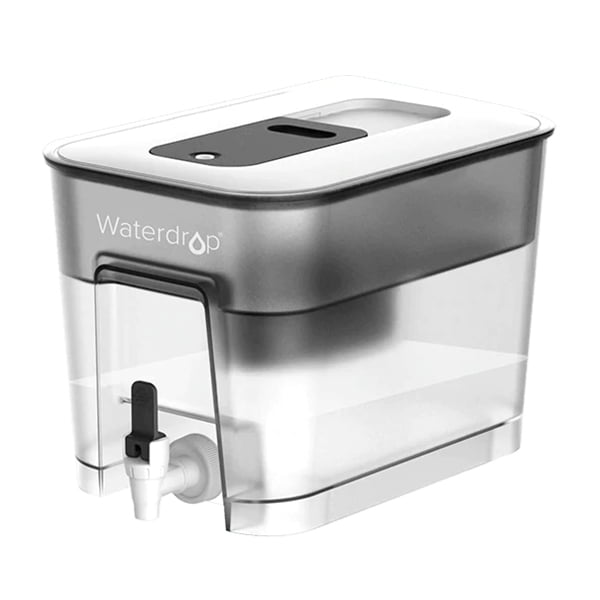
Waterdrop |
|
| Price: | $ |
| Type: | Standard |
| Size: | 20 Cups |
| NSF: | 42 |
| Filter Life: | 200 Gallons |
|
Our Rating
|
|
Pros
- Non-woven fabric, ion-exchange resin, activated carbon fiber, and coconut shell activated carbon are used to adsorb, trap, reduce, and oxidize contaminants including chlorine, lead, mercury, and aluminum.
- NSF 42 certification for reduction of chlorine taste and odor.
- Water is filtered at a flow rate of 0.5 gallons per minute. Quite fast, so no long waiting times.
- A storage capacity of 20 cups is much less than what goes into Epic Water Filters dispensers, but should still be enough for up to 3 to 4 people.
- Due to compactness, this filter dispenser fits most fridges.
- There is a slidable lid for easy filling.
- Anti-slip bottom promotes safety.
- Materials are both BPA and lead-free.
- As with most filter water dispensers, maintenance is pretty simple. All you need to do is replace the filter cartridge every 200 gallons or 2 months, whichever comes first.
- LED filter life indicator built into the lid reminds you when it’s time to replace. Blue light = good; flashing red light = 10 days left; permanent red light = replace now.
- Waterdrop offers a 30-day satisfaction guarantee on all its products.
Cons
- The 3-month warranty is rather short.
- 200 gallons filtration capacity is great, but according to Waterdrop filter replacement is due after a mere 2 months. What if you don’t need 3 gallons of filtered water per day?
- Filtration at 0.5 gpm is a clear sign that the process isn’t very thorough.
Best for
The Waterdrop is best for people who want a combination of basic filtration, long filter life, and affordability.
6. Best for TDS Removal: ZeroWater 20 Cup Ready-Pour 5-Stage Water Filter Dispenser
As the name suggests, ZeroWater filters reduce water TDS to “0” or close by. This also applies to company’s 20-cup filter dispenser.
But is TDS really a good measure to determine drinking water quality?

ZeroWater 20 Cup |
|
| Price: | $ |
| Type: | Standard |
| Size: | 20 Cups |
| NSF: | 42, 53 |
| Filter Life: | 20 Gallons |
|
Our Rating
|
|
Pros
- 5 filter layers produce great tasting drinking water – at least most of the time (more below).
- Fine screen rejects larger particulates.
- Activated carbon and oxidation alloy reduce heavy metals, chlorine, and organic water contaminants.
- Ion exchange resin eliminates even more heavy metals among other stuff.
- A second filter screen with a membrane layer traps leftover particles.
- The dispenser has been certified against NSF/ANSI 42 for removal of unpleasant chlorine taste and odor (97.5%).
- NSF/ANSI 53 certification guarantees reduction of harmful chromium 6 (99.6%), lead (95.9-99.7%), PFOA & PFOS (94.9%), and mercury (96.0-96.7%).
- Aside from 99.6% TDS, other water contaminants that will be removed include arsenic, cadmium, copper, manganese, asbestos, fluoride, and nitrate.
- All in all, your tap water will be much safer.
- 20 cups water storage is sufficient for family use.
- The push-button dispense spigot allows you to draw water even while the reservoir is still filtering.
- TDS meter is part of the package.
- Check current state of filter by measuring output water TDS. If it reads “006” or more it’s time to install a new one.
- 1-year warranty has you covered.
Cons
- For public water supplies only.
- If your water reads zero TDS, it does not mean it’s free from contamination. Zero TDS only means all dissolved solids have been removed, so primarily calcium and other minerals, salts like sodium, and organic compounds (e.g. sulfides). Thus, TDS removal is more about improving water aesthetics than about making water healthy and safe to drink.
- Filtration speed can be very slow.
- We read about issues with clogging filters. Some didn’t even reach the 10-gallon mark. More frequent replacements add to the maintenance cost.
- Filters are cheap, but even when they don’t clog they just don’t last very long. Their rating is 20 gallons of filtered water.
- Some reviewers reported bad taste after a couple of days of using the dispenser.
- There also have been issues with leaks.
Best for
The ZeroWater is best for people who want their drinking water to be free from TDS.
7. PUR PLUS Large Filtered Water Dispenser
In our next water filter dispenser review, we take a deep look at the PUR PLUS.

PUR PLUS |
|
| Price: | $ |
| Type: | Standard |
| Size: | 30 Cups |
| NSF: | 42, 53, 401 |
| Filter Life: | 40 Gallons |
|
Our Rating
|
|
Pros
- What we have here is a 30-cup (12 cups feed water reservoir, 18 cups bottom stage) purified water dispenser, large-enough for family use but with a slim design to fit most fridges.
- Granular activated carbon (GAC) and ion exchange filter media reduce certain pesticides and heavy metals. Plus, pleated paper reduces lead and other floating particulates.
- WQA-certified against NSF standards 42, 53, and 401 to reduce lead (98.5-99.3%), chlorine taste and odor (97.5%), chemicals like carbon tetrachloride (96.8%) and ethylbenzene (96.2%), emerging compounds such as BPA (99.0%) and Ibuprofen (95.5%), and more.
- You can dispense while filtering using the pull-down spout.
- A carrying handle allows for easy transport.
- Setup is quick and easy.
- Can be washed in dishwasher.
- All materials are BPA-free.
- Although frequent filter replacements are required (every 40 gallons or 2 months), maintenance is simple.
- Filter change light alters you when the filter needs replacing.
Cons
- The main issue is clogging filters causing slow filtration.
- PUR says this occurs if air pockets are trapped inside the filter. They further suggest shaking, soaking, and flushing affected cartridges to remedy this. Bad news is, this doesn’t always solve the problem…
- You cannot secure the lid on top. It just sits loosely. Thus, you need to keep the dispenser perfectly level or it will tilt and water spills everywhere.
- Malfunctioning timers.
- We would have preferred an extended warranty. 90 days feels a little short.
Best for
The PUR PLUS is ideal if you’re looking for NSF-certified water treatment, low price, and easy setup and use.
8. Best Budget Option: Brita UltraMax Dispenser
If the Brita UltraMax dispenser is one thing, it’s affordable. And this also goes for replacement filters. This is probably the main reason why it’s so popular.
However, Brita water filtration leaves some to be desired. The Elite filter offers a quick fix for removing bad taste and odor, organic chemicals, and few heavy metals, but that’s about it.
Bottom line: When it comes to water filter dispensers, there are more effective options out there, but few that are equally affordable

Brita UltraMax |
|
| Price: | $ |
| Type: | Standard |
| Size: | 27 Cups |
| NSF: | 42, 53, 401 |
| Filter Life: | 120 Gallons |
|
Our Rating
|
|
Pros
- Price tag is hard to beat.
- You can choose between Brita Standard and Elite filter elements. We definitely recommend the latter. It does a better job at removing different types of contaminants from water, including 99.55% lead and 97.4% chlorine.
- NSF-certified against 3 standards.
- 27 cups total storage capacity is good for family use.
- Sleek design should easily fit in your refrigerator and doesn’t take up a lot of countertop space either.
- Water dispensing is easy using the spigot.
- Overall quality is decent. The polycarbonate plastic is BPA-free and easy to keep clean.
- One Brita Elite filter will last you 120 gallons of filtered water making maintenance effortless. Cost: ~$55-60 a year which is affordable.
- The filter life indicator reminds you when to change filters.
Cons
- Short 90-day manufacturer warranty.
Best for
The Brita UltraMax dispenser is best for people on a really tight budget.
→ Read the Full Brita Ultramax Review
Comparison List
How do the best water filter dispensers perform when directly compared?
(Mobile Hint: Swipe to Scroll)
| Model | Price | Type | Size | NSF | Filter Capacity | Additional Info |
|---|---|---|---|---|---|---|
| Epic Pure & Epic Nano | $ | Standard | 2.2 gal | 42, 53, 401, P473 | 150 gal | – |
| AquaTru | $$$ | Countertop RO | – | 42, 53, 58, 401, P473 | 600-1,200 gal | – |
| pH Recharge | $ | Alkaline Gravity | 2.25 gal | – | 96 gal | – |
| Big Berkey | $$$ | Gravity | 2.25 gal | 42, 53 | 3,000 gal | – |
| Waterdrop | $ | Standard | 20 Cups | 42 | 200 gal | – |
| ZeroWater | $ | Standard | 20 Cups | 42, 53 | 20 gal | – |
| PUR PLUS | $ | Standard | 30 Cups | 42, 53, 401 | 40 gal | – |
| Brita UltraMax | $ | Standard | 27 Cups | 42, 53, 401 | 120 gal | – |
Buying Guide: How We Picked the Best Water Filter Dispensers + What You Need to Consider
The following are things worth considering before you go out and buy a water filter dispenser for your home. These are also the very same criteria we focused on when picking our top products for this guide.
Contaminant Removal
Different water filter dispensers use different water filtration methods. Depending on the quality of your water supply, you might want to consider a higher-end model that works more thoroughly.
Standard water filter dispensers will still get rid of various basic contaminants, but they might not remove everything from the water, including particles that could potentially be harmful to your health.
It’s important to have a good understanding of your current situation before committing to a purchase like this. If possible, order a test to verify exactly how serious your water supply’s contamination issues are, and base your decision on those results. You can also consult a specialist who can advise you based on the conditions in your specific region.
NSF/ANSI Testing and Certifications
Various official tests and certifications serve as indicators of the overall filtration performance of a water dispenser. If you’re interested in removing chlorine, Standard 42 will be of particular interest to you, while Standard 53 is related to general contaminants which could potentially be harmful to your health.
Some of the standards are relatively new and not a lot of testing has been carried out on them yet, so you might find that information on them is a bit limited.
It’s also important to remember that these certifications are always granted for a specific percentage of successful filtration, but that number is pretty much never 100%. This means that even a filter with a variety of certifications will still let a small number of contaminants through.
Filtration Capacity
Filtration capacity can have a significant impact on the long-term cost of using a water dispenser. Some cheaper models can end up more expensive in the long run due to needing more frequent filter replacements.
It’s always important to consider how much the cost will add up over one or two years. Especially since some models need their filters changed every couple of weeks, while others can last for much longer.
Storage Volume
The larger storage volume compared to pitchers is one of the main benefits of a water filter dispenser for many users.
Since dispensers are easy to refill and pour water from by design, there is no real downside to going with a larger model, other than space considerations in your home.
As long as the dispenser provides adequate filtration, there’s no issue with letting larger amounts of water sit in the tank for several hours.
Filtering Speed
Some water dispensers utilize pumps to increase their filtering speed. Others just let water run through the filter on its own, which usually takes more time, especially with more complex filtration systems that include multiple steps.
Filtering speed is often offset by the increased storage capacity of most dispensers, making it somewhat irrelevant in all but the largest households.
If you live with a large family and expect that your dispenser will have to be refilled more frequently, you might want to pay closer attention to this factor.
Ease of Use
Water filter dispensers are typically very easy to use and require minimal maintenance from the user.
Cleaning the dispenser and replacing the filters on a regular basis is the most you normally would have to do. We value models that don’t introduce any complicated gimmicks and focus on the bare essentials – dispensing clean, fresh drinking water. Some of the best models on the market are ideal for families with children due to the simplicity of their operation.
Warranty & Cost
With warranty varying so much across the board, it’s an important factor to pay attention to. Some models are only covered for a few months, while other manufacturers provide a lifetime warranty for their products.
Longer warranty is an indication of confidence on the part of the manufacturer and is a good sign that they expect their product to last a longer time.
Filter replacements are obviously not included in this – it’s part of the ongoing maintenance costs of your dispenser and you’re expected to cover that on your own.
BPA-Free Materials
Using BPA-free materials is crucial for any product used to hold or dispense water. Research on the effects of the compound on human health is still ongoing, but many organizations have been pushing for stricter regulation of it on the consumer market.
BPA can leave deposits in the water over time, which then end up in your system. Exposure to BPA has been linked with health complications in the brain and prostate glands of children and infants and has even been shown to have a negative effect on their mood and behavior.
More on Water Filter Dispensers
What Is a Water Filter Dispenser?
Many of us are familiar with water filter pitchers, as many households own at least one. Water filter dispensers build on top of the same idea, providing more storage space and an easier method for dispensing water, at the expense of making the device slightly less portable.
Typically, water filter dispensers use a regular spout, allowing users to dispense water without having to lift the whole unit.
What Are the Different Types of Filter Dispensers and How Do They Work?
Water filter dispensers are usually categorized according to their filtration process. Different filters can remove different contaminants from the water supply.
- Adsorption filters work great for chlorine and similar substances. They’re typically based on activated carbon derived from coconut shells. The main idea behind an adsorption filter is to utilize a highly porous surface to capture contaminants and trap them permanently.
- Ion exchange relies on a special resin which removes harmful ions such as lead and cadmium from water.
- Reverse osmosis is a more advanced purification process which uses pressure to push water through a semipermeable membrane, rejecting many contaminants in the process. When it comes to substances like fluoride, reverse osmosis is one of the few options available on the market that can work reliably.
Many models on the market use a combination of the above methods and don’t rely on a single mode of filtration or purification exclusively. This increases the overall quality of the water they dispense, and helps treat a variety of problems, including unhealthy contaminants and foul smell or taste.
Depending on the quality of your water supply, you might want to prioritize specific filter types in your search.
Who Needs a Water Filter Dispenser?
Water filter dispensers are useful for households with contamination problems in their water supply.
Filtration isn’t the only benefit of using a water filter dispenser though. It can also add a lot of convenience to your daily life, providing you with fresh, clean drinking water without having to refill a smaller pitcher.
Filter dispenser are also particularly useful for larger households, as they address some of the common frustrations associated with using a smaller water filter. Namely, a large dispenser doesn’t have to be refilled as often and can be used without having to lift the whole thing up.
Combined with how easy to use most models are, water filtering dispensers are great for families with children and elderly people who can serve themselves without issues.
The Benefits of Using a Filtered Water Dispenser
There are many benefits to using a filtered water dispenser. Even if the quality of your household’s water supply isn’t that bad, a water dispenser can still be a worthwhile investment that can improve your life in different ways.
1. Healthy and Safe Drinking Water
Purification is the main benefit of using a water filtration dispenser, and it’s the primary reason to invest in one for many people. Even if you haven’t noticed any specific issues with the cleanliness of your water supply, a filter dispenser can still be a sensible purchase as it will remove contaminants you might not even be aware of.
If you’re not sure whether your water supply requires filtration, ordering a test can shed some light on the situation.
2. No Unpleasant Tastes and Odors
The filters used in most domestic dispensers can effectively get rid of unpleasant taste or smell by removing the substances that cause those issues.
This might require purchasing a unit that utilizes a specific filtration process, and it’s a good idea to consult an expert familiar with the water supply issues in your local region. They can advise you on the kinds of contaminants that need to be removed.
3. Affordability
Even the best water dispenser filters tend to cost less than more advanced whole house purification systems. This makes it an attractive option for users who are on a tight budget, as well as those who are not sure how much they want to invest in the purification of their household water supply yet.
The affordability of water dispensers makes them a good stepping stone towards more advanced purification systems.
4. Ease to Use
Most filtered water dispensers are very easy to use. From filling the unit with water to dispensing it, everything follows simple steps that can be carried out by most people. Even replacing the filter is often not complicated and doesn’t require any professional assistance.
Assembling filter dispensers is also within the capabilities of most users, as these units don’t need to be hooked up to the plumbing.
5. Portability
For users on the go, or those with small households who frequently find themselves rearranging things, the portability of a water purifier dispenser can make it a very convenient option for water filtration.
Most models are small enough to fit on your countertop and can be moved easily when they’re empty. Some smaller models even remain light enough to move around when they’re completely full. These can work great for camping trips and other situations where portability is one of the most important factors.
When and How to Change a Water Filter Dispenser
Replacing the filter in your water dispenser is the only serious form of maintenance most models require in the long term. This is often simple and can be done by any user without specialized training. In many models, the whole process is as simple as removing the old cartridge and putting the new one in.
Typically, access to the filter is enabled through a dedicated access point or hatch, and you don’t need to unscrew anything or perform other complex operations. Some models are an exception to this, but even in them, the amount of work required is minimal.
How often you should change your water dispenser’s filter depends on the model. In some units, you might have to do it as frequently as once every two or three months. In others, you can go up to two years without replacing anything. Keep in mind that filter change frequency is rated in two ways – duration of time and water volume.
Some models, for example, are rated for 1,200 gallons, which are estimated by the manufacturer to around two years of use for the average household. This might not be the case for your family though. If your model comes with a filter change indicator, this is your best bet for figuring out when maintenance is required.
Always pay attention to the instructions for priming your new filter! Once a new filter has been inserted, it often needs some time to activate properly. In most models, this is done by running a certain volume of water through the filter before using it for the first time.
Cleaning: How to Take Care of Your Filter Dispenser
Cleaning a water filter dispenser is easy and doesn’t require any special equipment:
- Depending on how the device is designed, you might have to remove the filter before starting.
- Then, remove any detachable parts and set them aside.
- Once you’ve disassembled your dispenser, give each part a thorough cleaning with soapy water. Feel free to soak smaller parts while you’re washing larger ones.
- In the end, put everything back together, and put the filter back in place.
- If you’re replacing the filter, follow the manufacturer’s guidelines for priming it before using the dispenser again. This is often as simple as running a few cups of water through the new filter.
Avoid scratching your dispenser when cleaning it. Many models are made of plastic, and scratches can result in microscopic deposits of it making their way into your water supply. This can be particularly problematic if the damage is in a location past the filter, as those particles will then directly end up in your drinking water.
Therefore, you should only use a soft sponge to clean your dispenser, and never any hard brushes or even worse, steel wire.
If water in your area is particularly hard, you might notice some scale building up on the inside of your dispenser. You will need to clean the dispenser more regularly in that case, otherwise you risk having some of that build-up becoming permanent.
Frequently Asked Questions (FAQ)
- Which water filter pitcher removes the most contaminants?
The Epic Pure and the Epic Nano are the two dispensers tested to remove the most water contaminants – over 200 in total! - How do you clean a water filter dispenser?
When cleaning a water filter dispenser, it’s best to use a soft brush and mild dishwasher detergent. Make sure to clean all the edges, and rinse properly afterwards. - Are water filter dispensers worth it?
Water filter dispensers are definitely worth it. There are several models that can improve the quality of your drinking water considerably. - How much does a filter dispenser cost?
It depends on product quality and the sophistication of the filtration process. Cheap units start at around $30. High end filter dispensers can cost several hundred dollars.
Questions? Ask away!
Information provided on BOS is for educational purposes only. The products and services we review may not be right for your individual circumstances.
We adhere to strict editorial guidelines. Rest assured, the opinions expressed have not been provided, reviewed, or otherwise endorsed by our partners – they are unbiased, independent, and the author’s alone. Our licensed experts fact-check all content for accuracy. It is accurate as of the date posted and to the best of our knowledge.


